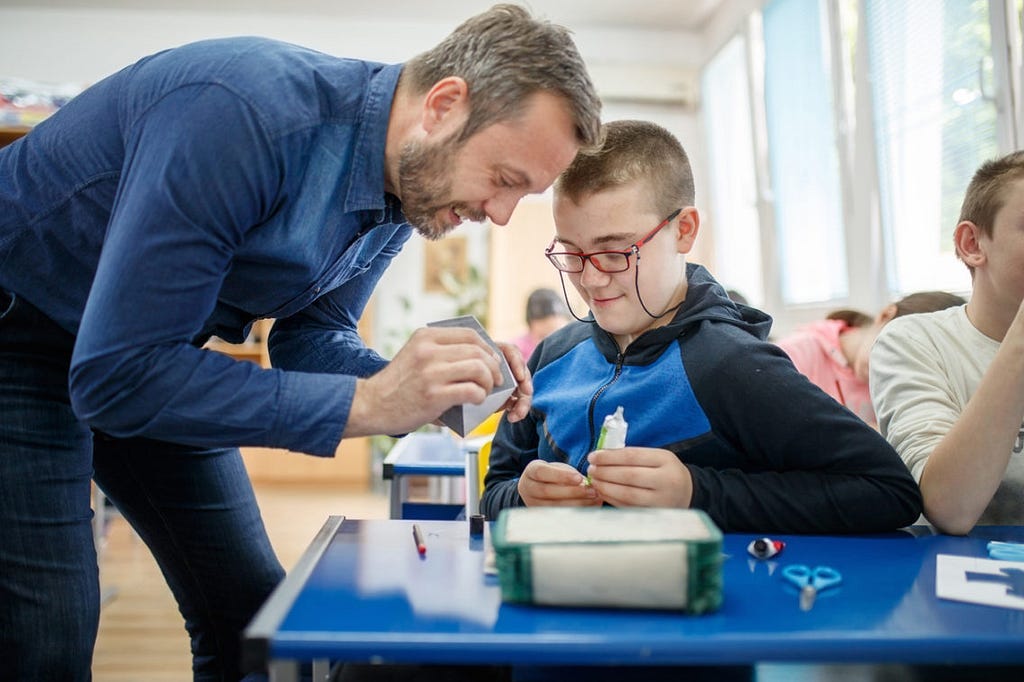Neurodiversity in the Workforce: Ben Gold Of Recommended Home Buyers On Why It’s Important To Include Neurodiverse Employees & How To Make Your Workplace More Neuro-Inclusive
An Interview With Eric Pines
Flexible Work Arrangements: Offer flexible work hours and remote work options to accommodate different work styles and preferences. For example, allowing employees to choose their preferred working hours or providing the option to work from home can support neurodiverse individuals in optimizing their productivity.
Research suggests that up to 15–20% of the U.S. population is neurodivergent. There has been a slow but vitally important rise in companies embracing neurodiversity. How can companies support neurodiversity in the workplace? What are some benefits of including neurodiverse employees? To address these questions, we are talking to successful business leaders who can share stories and insights from their experience about “Neurodiversity in the Workforce”. As a part of this series, we had the pleasure of interviewing Ben Gold.
Ben Gold, the Founder of Recommended Home Buyers, is an investor and developer in Philadelphia with over 5 years of experience in remodeling homes, keeping them for rentals, and flipping several houses. Ben Gold is proudly featured on Forbes, Story By JP Morgan, Better Homes & Gardens, Yahoo Finance, Homes & Gardens, Real Estate Witch, Go Banking Rates, Ownerly, Bankrate, Family Handyman, Realtor.com, Livingetc, Home Station, and Many More for his exceptional real estate development projects.
Thank you so much for joining us in this interview series! Before we dive in, our readers would love to “get to know you” a bit better. Can you tell us a bit about your ‘backstory’ and how you ended up where you are?
I am Ben Gold, the Founder of Recommended Home Buyers, and I am an investor and real estate developer based in Philadelphia, PA. With over 5 years of experience in remodeling homes, keeping them for rentals, and successfully flipping several houses, I am deeply committed to making a positive impact in the real estate industry. My expertise as a real estate developer has allowed me to create sustainable and innovative housing solutions, while my dedication to environmental sustainability and social impact led me to establish Recommended Home Buyers. My work has been recognized and featured in prestigious publications such as Forbes, Story By JP Morgan, Better Homes & Gardens, Yahoo Finance, Homes & Gardens, Real Estate Witch, Go Banking Rates, Ownerly, Bankrate, Family Handyman, Realtor.com, Livingetc, Home Station, and Many More.
You are a successful leader. Which three character traits do you think were most instrumental to your success? Can you please share a story or example for each?
Three character traits that were most instrumental to my success are adaptability, empathy, and perseverance. For instance, adaptability allowed me to navigate ever-changing real estate markets, while empathy helped me understand the unique needs of homeowners and clients. Moreover, perseverance has been crucial in overcoming challenges and achieving success in my endeavors.
Can you share a story about one of your greatest work-related struggles? Can you share what you did to overcome it?
One of my greatest work-related struggles was when I faced difficulties in integrating sustainable materials into my real estate projects. However, through research and collaboration with like-minded suppliers, I successfully found eco-friendly and cost-effective solutions, reinforcing my commitment to sustainability.
What are some of the most interesting or exciting projects you are working on now?
Currently, I am working on a project that involves renovating an old historic building in Philadelphia and turning it into a sustainable, mixed-use space. We are incorporating energy-efficient technologies, renewable energy sources, and environmentally friendly materials to create a model of sustainable urban development.
Fantastic. Let’s now shift to our discussion about neurodiversity in the workforce. Can you tell our readers a bit about your experience working with initiatives to include neurodiverse employees? Can you share a story with us?
As a leader at Recommended Home Buyers, we have actively worked to include neurodiverse employees in our company. For instance, we have implemented neuro-inclusive initiatives such as providing flexible work arrangements, offering support networks for neurodiverse employees, and creating accessible workspaces. These measures have not only benefited our employees but have also fostered a more creative and diverse work culture.
This may be obvious to you, but it will be helpful to spell this out. Can you articulate to our readers a few reasons why it is so important for a business or organization to have an inclusive work culture?
Creating an inclusive work culture is vital for any business or organization. Embracing neurodiversity allows us to tap into unique perspectives, skills, and talents that lead to greater innovation and problem-solving. Additionally, it promotes a sense of belonging and acceptance among employees, resulting in higher morale and increased productivity.
Can you share a few examples of ideas that were implemented at your workplace to help include neurodiverse employees? Can you share with us how the work culture was affected as a result?
At Recommended Home Buyers, we have implemented various initiatives to support neurodiverse employees. One example is providing flexibility in work hours and remote work options, which allows neurodiverse individuals to optimize their productivity and well-being. We also offer employee resource groups and support networks where employees can share experiences, provide mutual support, and suggest improvements to company policies. These initiatives have created a more inclusive and supportive work environment, where every employee feels valued and heard.
What are some of the challenges or obstacles to including neurodivergent employees? What needs to be done to address those obstacles?
Some challenges to including neurodivergent employees include misconceptions and stigmas surrounding neurodiversity, as well as a lack of understanding about how to support and accommodate their unique needs. To address these obstacles, businesses must prioritize education and awareness about neurodiversity, conduct training sessions for all employees to foster empathy and reduce stigma, and work with professionals to create personalized accommodations for neurodiverse individuals.
How do you and your organization educate yourselves and your teams on the concept of neurodiversity and the needs of neurodivergent employees? Are there any resources, training, or workshops that you have found particularly helpful?
We prioritize ongoing education and training on the concept of neurodiversity and the needs of neurodivergent employees. We regularly organize workshops and training sessions led by experts in the field of neurodiversity, and we actively seek out resources from reputable organizations and publications focused on neurodiversity in the workplace. Additionally, we encourage open discussions and sharing of experiences among our employees to foster a culture of understanding and support.

This is the main question of our interview. Can you please share five best practices that can make a business place feel more welcoming and inclusive of people who are neurodivergent?
1 . Flexible Work Arrangements: Offer flexible work hours and remote work options to accommodate different work styles and preferences. For example, allowing employees to choose their preferred working hours or providing the option to work from home can support neurodiverse individuals in optimizing their productivity.
2 . Employee Resource Groups: Establish employee resource groups or support networks specifically for neurodiverse employees. These groups provide a platform for sharing experiences, offering mutual support, and suggesting improvements to company policies.
3 . Neuro-Inclusive Training: Conduct training sessions for all employees to raise awareness about neurodiversity, reduce stigma, and foster empathy. Train employees on how to support and interact with their neurodiverse colleagues effectively.
4 . Accessible Workspaces: Ensure that the workplace is physically and digitally accessible for all employees. For instance, providing noise-cancelling headphones or creating quiet spaces can be beneficial for neurodiverse individuals who are sensitive to noise.
5 . Accommodations and Support: Offer personalized accommodations for neurodiverse employees based on their unique needs. Collaborate with professionals and specialists to create an environment where neurodiverse individuals can thrive and contribute effectively.
Can you please give us your favorite “Life Lesson Quote”? Can you share a story about how that was relevant in your own life?
My favorite life lesson quote is ‘Success is not final, failure is not fatal: it is the courage to continue that counts’ by Winston Churchill. This quote has been highly relevant in my life and career. It reminds me that success is not the end goal but rather the ability to keep pushing forward despite setbacks. It takes courage and perseverance to overcome challenges and achieve greatness.
You are a person of enormous influence. If you could inspire a movement that would bring the most amount of good to the most amount of people, what would that be? You never know what your idea can trigger. 🙂
If I could inspire a movement, it would be to promote environmental sustainability and conservation. By raising awareness about the importance of protecting our planet and inspiring action at all levels — from individual consumer choices to corporate policies and international agreements — we can create a world that is cleaner, healthier, and more equitable for everyone. This movement would involve educating individuals and communities about sustainable practices, advocating for stronger environmental regulations, developing innovative technologies and business models that prioritize sustainability, and fostering collaboration across sectors and borders to tackle global challenges like climate change and biodiversity loss.
How can our readers further follow your work online?
Readers can follow my work and stay updated on my latest projects, events, and initiatives related to environmental sustainability and social impact through my website and social media channels:
Website: www.recommendedhomebuyers.com
LinkedIn: https://www.linkedin.com/company/recommended-home-buyers
Facebook: https://www.facebook.com/people/Recommended-Home-Buyers/100088965278811/
Instagram: https://www.instagram.com/recommendedhomebuyers/
YouTube: https://www.youtube.com/channel/UCjKIBt0Z2yMDxXIOqhO5TLg/featured
TikTok: https://www.tiktok.com/@recommendedhomebuyers
Twitter: https://twitter.com/RecommendedHome
Pinterest: https://www.pinterest.com/recommendedhomebuyers/
This was very inspiring. Thank you so much for the time you spent with this. We wish you continued success and good health!
Thank you for the thoughtful conversation. It’s been a pleasure sharing my insights, and I’m hopeful that together, we can foster a more inclusive and thriving workforce. Wishing you all the best as well!
About the Interviewer: Eric L. Pines is a nationally recognized federal employment lawyer, mediator, and attorney business coach. He represents federal employees and acts as in-house counsel for over fifty thousand federal employees through his work as a federal employee labor union representative. A formal federal employee himself, Mr. Pines began his federal employment law career as in-house counsel for AFGE Local 1923 which is in Social Security Administration’s headquarters and is the largest federal union local in the world. He presently serves as AFGE 1923’s Chief Counsel as well as in-house counsel for all FEMA bargaining unit employees and numerous Department of Defense and Veteran Affairs unions.
While he and his firm specialize in representing federal employees from all federal agencies and in reference to virtually all federal employee matters, his firm has placed special attention on representing Veteran Affairs doctors and nurses hired under the authority of Title. He and his firm have a particular passion in representing disabled federal employees with their requests for medical and religious reasonable accommodations when those accommodations are warranted under the Rehabilitation Act of 1973 (ADA). He also represents them with their requests for Federal Employee Disability Retirement (OPM) when an accommodation would not be possible.
Mr. Pines has also served as a mediator for numerous federal agencies including serving a year as the Library of Congress’ in-house EEO Mediator. He has also served as an expert witness in federal court for federal employee matters. He has also worked as an EEO technical writer drafting hundreds of Final Agency Decisions for the federal sector.
Mr. Pines’ firm is headquartered in Houston, Texas and has offices in Baltimore, Maryland and Atlanta, Georgia. His first passion is his wife and five children. He plays classical and rock guitar and enjoys playing ice hockey, running, and biking. Please visit his websites at www.pinesfederal.com and www.toughinjurylawyers.com. He can also be reached at eric@pinesfederal.com.
Neurodiversity in the Workforce: Ben Gold Of Recommended Home Buyers On Why It’s Important To… was originally published in Authority Magazine on Medium, where people are continuing the conversation by highlighting and responding to this story.
